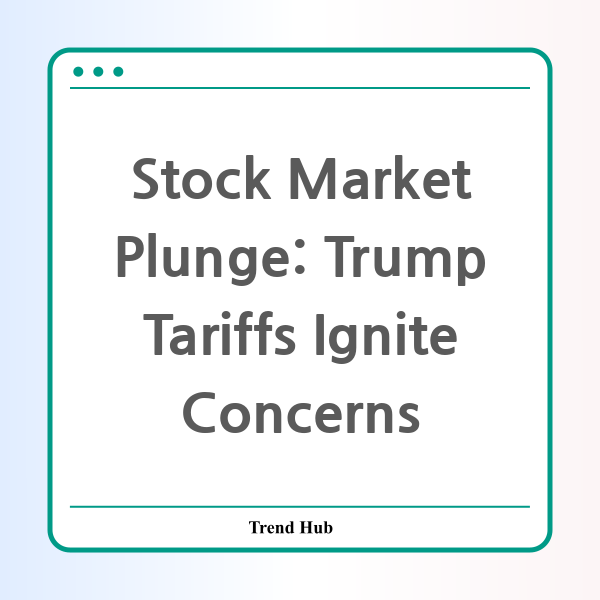* This website participates in the Amazon Affiliate Program and earns from qualifying purchases.

The stock market has seen turbulent times lately, and the latest news regarding tariffs introduced by President Trump has sent shockwaves through Wall Street, leading to significant market sell-offs. The Dow Jones Industrial Average, which at one point showed signs of recovery, ultimately plummeted by over 900 points. This decline, largely attributed to economic fears linked to new tariffs on imports from Mexico and Canada, raises pressing questions about the future of both the stock market and the U.S. economy.
On Monday, March 2, 2024, stocks across the board retreated sharply. The Dow fell by 907 points, translating to a 2.1% drop, while the S&P 500 and Nasdaq saw even steeper declines of 2.3% and 3.2%, respectively. These numbers reflect a broader trend of uncertainty that has enveloped the market since the start of February, exacerbated by fears surrounding the ramifications of impending tariffs.
President Trump has made it clear that he intends to implement a 25% levy on imports from Canada and Mexico, reiterating that there is "no room left" for negotiation. This announcement shocked many investors, who were optimistic about the possibility of a last-minute resolution to avoid these tariffs. Instead, the reality of impending costs hit hard, leading to a pronounced risk-off sentiment that affected various sectors, particularly technology and small-cap stocks.
As the trading day progressed, it became apparent that the initial upbeat trend was fleeting. The afternoon saw a stark decline, which sent many tech stocks reeling. Notably, Nvidia, a once-popular choice among investors, saw its shares drop by more than 9%. All seven prominent tech stocks, dubbed the "Magnificent 7," were affected, showcasing the widespread panic that ensued.
Experts weighing in on the situation have highlighted that the tariffs present a considerable shock to the economy. Chris Rupkey, a chief economist at FWDBONDS, voiced concerns about the potential long-term impact on market stability. With fears mounting over a slowdown in economic growth—coupled with evidence of declining manufacturing as indicated by the ISM manufacturing PMI dropping to 50.3—investors are growing increasingly anxious.
The implications of a market downturn are not isolated to just stocks; broader economic indicators also suggest a potential decline. The first quarter economic growth, which analysts had previously hoped would remain robust, is now under scrutiny. The upcoming jobs report and retail earnings are crucial as they could either verify prevailing concerns or provide a cushion against them.
While tariffs dominate the headlines, there is also a notable reaction in other sectors. European leaders have rallied around Ukraine, infusing optimism into defense-related stocks. This comes at a time when traders are also diverting some attention to cryptocurrencies, which, after Trump's announcement regarding a U.S. strategic cryptocurrency reserve, have seen a surge in trading activity.
In summary, the recent sell-off in the stock market fueled by tariff announcements is indicative of a broader concern regarding economic stability. As U.S. policymakers grapple with these changes, the ability to inspire confidence within the market will be critical. With upcoming economic data on the horizon, investors remain on edge, hoping for signs of resilience amidst the turbulence.
As we navigate through these uncertain waters, it's essential for investors to stay informed and consider the broader implications of political decisions on market performance. The upcoming weeks will be pivotal in determining the trajectory of the stock market as we face the reality of tariffs and their potential fallout.
* This website participates in the Amazon Affiliate Program and earns from qualifying purchases.